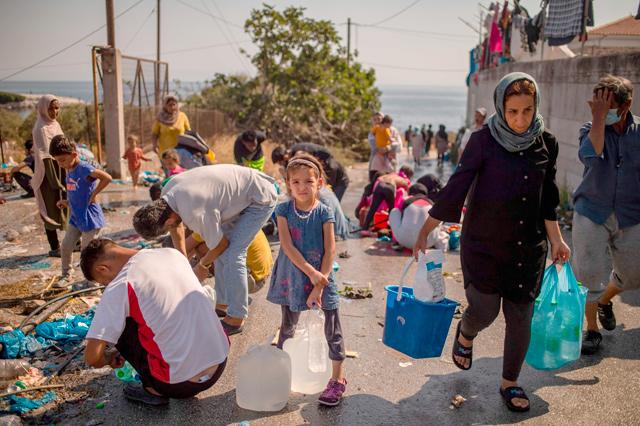- International News
- Thu-2020-09-17 | 04:09 pm

Nayrouz News Agency :
The UN refugee agency on Wednesday urged Greece to speed up asylum processes on the island of Lesbos, so that thousands of migrants still sleeping rough a week after their camp burned down in an apparent arson attack can be removed.
"The idea is not that people remain for ever on the island of Lesbos, but that processes are accelerated so that people can leave gradually and in an orderly way" to capital Athens or elsewhere on the mainland, the UN agency's chief in Greece Philippe Leclerc told reporters.
Greece's police minister Michalis Chrysochoidis this week said that "half" the migrants on Lesbos should be able to leave "by Christmas" and "the rest by Easter".
Over 12,000 people including entire families with elderly and newborns were left homeless when Europe's largest asylum seeker camp Moria burned down on September 8.
Arson charges
Six young Afghans have been arrested in connection with the incident, with four of them brought before a Lesbos magistrate on Wednesday.
They face a host of charges including arson, fomenting unrest, property damage, illegal use of force and attempting to injure police.
Two others, both aged 17, had initially been taken off the island in a mass operation to put unaccompanied minors out of harm's way, and will be charged at a later date, a court source said.
Greek officials had insisted from the start that the fires that destroyed the Moria camp were the result of arson.
Late on Tuesday, another camp of over 4,700 people on the island of Samos was threatened by fire. Three migrants are being questioned by police over the incident.
On Lesbos, crews this week hastily put together another tent camp which according to EU home affairs commissioner Ylva Johansson will eventually accommodate up to 9,000 people.
On Wednesday, the Greek migration ministry said roughly 1,200 of the 12,000 Moria migrants had been housed at the site.
"We expect 2,000 will enter by tonight,” a migration ministry source said.
Of those in the camp, 35 have tested positive for coronavirus.
But thousands have been sleeping on the street for the past week, with limited access to food and no sanitation for families including elderly and newborns.
‘We are not animals!’
"This is the 21st century! Supermarkets are closed, there are no toilets... we are not animals!” raged Ange, a 23-year-old asylum seeker from DR Congo who was a mechanical engineer in his homeland.
A migration ministry source in Athens on Wednesday said coronavirus lockdown restrictions had been removed for camps on the islands of Chios and Kos for the first time in months.
But they remain in place for the camps on Samos and Leros until September 29, after three positive cases among residents, the official said.
Five years after the arrival in Europe of over a million asylum seekers, many fleeing wars in Iraq and Syria, the question over how the bloc should share out its refugee responsibilities remains sensitive.
In Brussels, EU Commission President Ursula von der Leyen said the bloc would "abolish” the existing Dublin Regulation, which makes asylum seekers the responsibility of the first member state where they set foot.
Von der Leyen promised "a new European migration governance system” with "common measures on asylum and return and... a strong solidarity mechanism”.
Germany has already offered to take in 1,553 refugees from Greece, on top of the 150 unaccompanied minors from Moria.
France has agreed to take in 150 minors from the camp while other EU nations are admitting a total of 100 other youngsters from Moria.
"We need Europe to help us leave this place,” Ange said. "Would you accept these conditions if your children were in our place?”
"Please, open the gates,” implored 21-year-old Samira from Afghanistan.
"We are human beings. Please help the children, they are so very important for the future,” she said.













